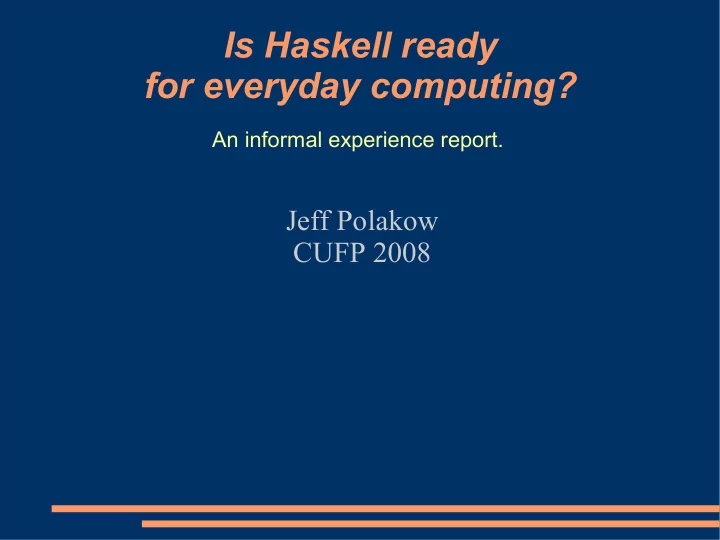

Is Haskell ready for everyday computing? An informal experience report. Jeff Polakow CUFP 2008
Talk Overview ● My background ● Job background ● System description ● Points of interest ● Conclusions
About Me ● Theoretical PL research ● Insecurity about utility of my work ● Desire to spread use of “good” languages
About My Job ● Small credit trading group ● Credit markets are opaque ● Information management is main task ● Quantitative analysis less important
Why Haskell? ● Because I can – My chance to put theory into practice – Curious to know how Haskell fares ● Easiest way for me to be productive – Usual typed, higher-order reasons – Nicer syntax than OCaml
System Overview ● Database and Web system ● Scheduler to spawn autonomous tasks ● Several communicating pieces ● Distributed over several computers
System Architecture database Slave task task data server task Slave Scheduler data server User Master data server Slave HAppS data server User
First Version ● GHC 6.6.1 (started with GHC 6.4) ● HappS 0.8.4, HDBC 1.0.1 (using ODBC) ● All XP ● All process (not thread) based – Issues with -threaded ● Somewhat primitive, but stable
Current Version ● GHC 6.8.3 ● HAppS 0.9.2, HDBC 1.1.5 (using ODBC) ● XP and Linux ● Threads (where possible) and processes ● Nice machinery for logical processes and servers ● More autonomous pieces talking to each other
Novelties ● Statically typed tables with mini SQL DSL – Manipulate tables in memory – Generates SQL queries to create a table in memory ● Automatic generation of RPC wrappers ● Proc monad for logical process machinery ● Abstract (socket-based) server machinery
The Good ● Usual stuff – Types & type classes for static guarantees – First class (higher-order) functions for code reuse ● Purity – Able to upgrade old (poorly documented) code with relative ease ● Performance not an issue (for our purposes)
The Bad ● Upgrading to 6.8.3 was painful – Some libraries don't like XP – Some libraries don't like cabal-install ● Errors / inadequacies of some libraries ● Most library documentation is poor
What is everyday computing? My very subjective criteria. ● Database access tools – HDBC, Takusen, etc... ● Web tools – HAppS, powerful but difficult to install and learn – HSP, WASH, etc... – Curl bindings, FTP lib work pretty well ● Ability to write stable server-like programs – Great lightweight threads support – Good socket interface
What is everyday computing? More very subjective criteria. ● Scripting – ghci as a shell, HSH – Good string processing machinery ● Foreign library interaction – FFI, plus helper tools, are good – No easy way to use .NET or Java libs ● Development Environment – GHC is easy to install & low maintenance – Libraries are not always easy to install – Available IDEs not adequate for everyone
Is Haskell ready for everyday computing? Yes ● if you are – a seasoned Haskell programmer – comfortable with laziness/strictness trade offs – comfortable reading library source code – capable of understanding and fixing linker errors – ... ● and, if in a corporate environment, you are – free to try drastically new things – capable of functioning without IT dept support
Recommend
More recommend